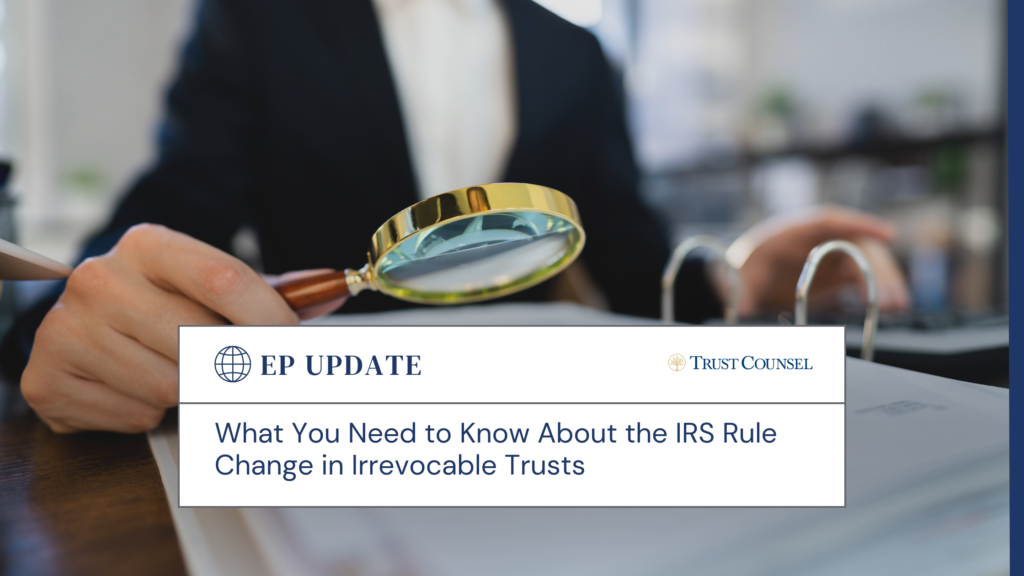Estate planning is a critical component of financial security, yet it often involves navigating a maze of tax regulations and legal considerations. One recent change in IRS regulations has significant implications for those using irrevocable trusts as part of their estate planning strategy.
Let’s take a look at the new IRS rule on irrevocable trusts, detailing what it means for estate planning and asset management.
Understanding Irrevocable Trusts and Step-Up in Basis
Irrevocable Trusts are a popular estate planning tool where the grantor transfers ownership of the trust assets, creating a separate legal entity to benefit the trust’s beneficiaries.
Once assets are placed into an irrevocable trust, they generally cannot be reclaimed by the grantor, protecting them from creditors and probate.
A key benefit of irrevocable trusts has been the step-up in basis. This provision allows the basis of inherited assets to be adjusted to their fair market value at the date of the decedent’s death, which can significantly reduce capital gains taxes for the beneficiaries.
For example, if a stock purchased at $100,000 appreciates to $250,000, the basis for the heirs would “step up” to $250,000, minimizing taxable gains upon sale.
The Recent IRS Rule Change
The IRS ruling, Rev. Rul. 2023-2, alters how the step-up in basis applies to assets held in irrevocable trusts. Previously, assets in irrevocable trusts received a step-up in basis at the grantor’s death, regardless of inclusion in the grantor’s taxable estate.
The new rule stipulates that for assets to receive this basis adjustment, they must now be included in the grantor’s gross estate for estate tax purposes.
Key Implications of the Rule Change
- Inclusion in Taxable Estate: To benefit from the step-up in basis, assets in an irrevocable trust must be included in the grantor’s gross estate. This means that only if the trust assets are subject to estate tax will they receive the basis adjustment.
- Estate Tax Exemptions: Given the current high estate tax exemption thresholds ($12.92 million per individual in 2023), most estates will not incur estate taxes. Thus, many trusts can still benefit from the step-up in basis without facing significant estate tax liabilities. However, this threshold is set to return to approximately $5 million in 2026, which could affect more estates.
- Strategic Planning Required: Estate planners will need to reassess strategies involving irrevocable trusts. For some, it may be beneficial to ensure that trust assets are included in the taxable estate to leverage the step-up in basis. This could involve revisiting trust terms or considering alternative estate planning tools.
Practical Steps for Estate Planners
Review and Reassess Trusts: If you have an irrevocable trust, it is crucial to review its terms with an estate planning attorney to understand how the new IRS rule impacts your strategy.
Consider Estate Size and Exemptions: Analyze your estate’s size in relation to the current and future estate tax exemptions. This analysis will help determine whether including trust assets in your taxable estate is advantageous.
Evaluate Alternatives: Depending on your financial goals and family situation, other estate planning tools, such as revocable trusts or different gifting strategies, might provide better outcomes under the new rules.
Still Have Questions? Trust Counsel is Here to Answer Them
The IRS rule change concerning irrevocable trusts and the step-up in basis adds significant complexity to estate planning. Addressing this issue is crucial to ensuring your assets are managed and transferred efficiently, minimizing tax burdens for your heirs.
If you still have questions, our expert team at Trust Counsel is here to guide you through these changes. Contact us to get all your questions answered and optimize your estate strategy.






